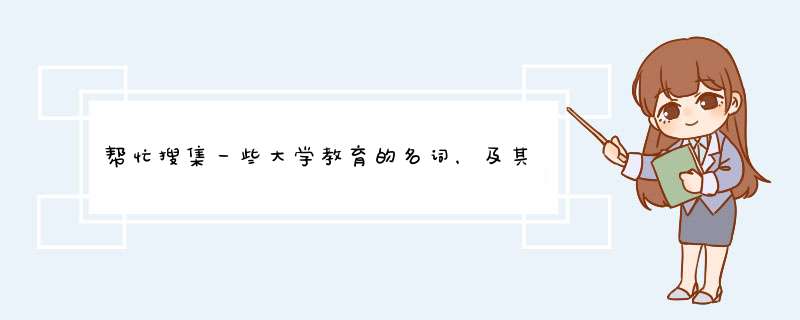
1.教育目的:是社会对教育所要造就的社会个体的质量规格的总的设想或规定。
Educational purposes: a community education to create the social individual vision of total quality specifications or requirements.
2.形式教育说:课程论中另一个长期引起争论的问题,是怎样看待知识在教学中的作用。一种观点认为,选择某种知识作为课程.就是因为这种知识可以训练人的智力,使人变得更聪明。这就是所谓的“形式教育说”。
Forms of education, said: Another long-term course on controversial issues is how to look at the role of knowledge in teaching. One view is that the choice of a knowledge as a course. Because such knowledge can be trained human intelligence, people become more intelligent. This is the so-called "form of education, said."
3.实质教育说:关于知识在教学中的作用,还有一种观点认为,选择某种知识作为课程的原因,就在于这种知识本身的价值。知识是人类智慧的结晶,是探求真理的钥匙,人们掌握了知识,就可以利用它去实现自己的各种生活目的。教育学上把这种观点称为“实质教育说”。
Real Education, said: on the role of knowledge in teaching, there is a view that the choice of knowledge as a reason for the course, is that the value of this knowledge itself. Knowledge is the crystallization of human wisdom is the key to exploring the truth, people mastered the knowledge, you can use it to achieve its purpose of all life. Education on to this view as "real education, said."
4.教学过程最优化:是前苏联教育家巴班斯基(1927-2987)提出的教学理论和方法。20世纪70年代,为了克服学生普遍存在的留级、学习成绩不佳的现象,巴班斯基提出,要对学校教学进行整体优化。教学过程的最优化是指在一定的教学条件下寻求合理的教学方案,使教师和学生花最少的时间和精力获得最好的教学效果,使学生获得最好的发展。
Optimize the teaching process: the former Soviet Union Babanski educator (1927-2987) proposed the theory and methods of teaching. 70 years of the 20th century, in order to overcome the widespread repetition of students, poor academic performance of the phenomenon, Babanski should be made to the overall optimization of the school teaching. Optimization of the process of teaching is the teaching of certain reasonable conditions for teaching programs, so that teachers and students spend the least time and effort to get the best effect of teaching so that students get the best development.
5.教学评价:是对教学工作质量所作的测量、分析和评定。它包括:对学生学业成绩的评价,对教师教学质量的评价和进行课程评价。
Teaching evaluation: It is the quality of teaching by the measurement, analysis and assessment. It includes: the evaluation of student achievement, teaching quality of teacher evaluation and curriculum evaluation.
6.美育:又称审美教育。是运用艺术美、自然美和社会生活美培养受教育者正确的审美观点和感受美、鉴赏美、创造美的能力的教育。
Aesthetic Education: also known as aesthetic education. Is the use of artistic beauty, natural beauty and social life of the United States train students correct the aesthetic point of view and feelings of beauty, appreciation of beauty, the ability to create beauty education.
7.学制:是学校教育制度的简称,指一个国家各级各类学校的系统,它规定各级各类学校的性质、任务、入学条件、修业年限以及它们之间的关系。
Educational system: the school system is short, a country schools at all levels of the system, which provides various types of schools at all levels of the nature, mission, admission criteria, length of study and their relationships.
8.班级授课制:是一种集体教学形式。就是把学生按照年龄和知识水平分别编成不同的班级,根据周课表和作息时间表,由老师有计划的对同一个班的全体学生同时进行同样内容的教学的一种组织形式。
Class Teaching: Teaching is a collective form. Is to the students by age and level of knowledge of different classes were compiled, according to weekly schedule and work schedule, planned by the teacher for all students with a class teaching the same content simultaneously a form of organization.
欢迎分享,转载请注明来源:内存溢出

 微信扫一扫
微信扫一扫
 支付宝扫一扫
支付宝扫一扫
评论列表(0条)